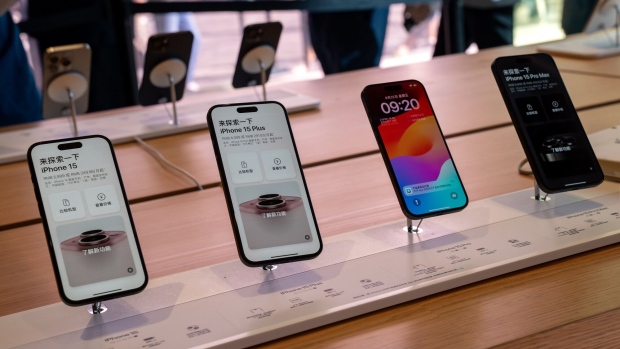Jul 3, 2024
Apple Seeks to Scrub ‘Dominance’ From China Antitrust App Ruling
, Bloomberg News

(Bloomberg) -- Apple Inc. is seeking to get a Chinese court to alter its written ruling in a lawsuit the iPhone maker won, an unusual move that underscores the sensitivity of the US company’s position in the world’s largest smartphone arena.
Apple has filed a petition asking the Supreme People’s Court to make tweaks to select sentences in a ruling that ended a dispute over the cut of app revenue it takes from most developers, according to an excerpt of the filing seen by Bloomberg News. The iPhone maker wants the nation’s highest court to strike references to Apple’s “dominant position” from a decision written by a lower court, which in May tossed out the lawsuit due to a lack of evidence. It’s also objecting to a phrase suggesting “unfair pricing may hurt consumers.”
Apple appears to be trying to play down its market position in China, where it’s often neck-and-neck with Huawei Technologies Co. and other high-end smartphone makers at the top of quarterly shipment rankings. The characterization of Apple’s “dominance” — in an official court decision — may get cited in future filings or cases at a time when regulators globally are closely scrutinizing tech giants. At issue is the fee that Apple and its rivals charge developers for hosting their apps on the store — as high as 50% in the case of popular Android mobile games in China, versus a general 30% in much of the rest of the world.
Apple’s unusual move to try and alter the language of a decision already in its favor reflects its delicate position in China — both its largest international market and biggest production base. The company is grappling with resurgent rival Huawei and the uncertainty of a ban on the use of foreign devices in many state firms and agencies. Globally, Apple and Google — which runs the Android app store — have been forced to defend app store policies to regulators in Europe and the US.
Apple is defending its fees on multiple fronts, including a lawsuit at home in the US and via challenges in Europe, South Korea and Japan. It has consistently argued its commissions are justified by the security and peace of mind that the app store provides users, while giving developers a global showcase.
In May, a Shanghai court dismissed a lawsuit over that practice, after ruling there was insufficient evidence to show Apple had abused its status. The plaintiff in that case accused Apple of abusing its market position, both with a 30% commission on in-app purchases and by restricting payment methods.
An Apple representative didn’t respond to requests for comment. The plaintiff — surnamed Jin — submitted a separate appeal in which she argued Apple is charging a fee in China that is higher than in Europe and the US, and that the iPhone maker was suppressing transactions through its policies.
The ruling coincides with moves by major Chinese developers and store operators to try and change the dynamics of the domestic app ecosystem.
In June, Tencent Holdings Ltd. made a surprise move to pull hit game DnF Mobile off Android app stores operated by Chinese smartphone makers including Huawei and Oppo, citing unspecified “adjustments” in their collaborations. Tencent executives have long expressed frustration over the up-to-50% cut those app platforms take from in-game purchases.
At the same time, Huawei is considering taking a cut of in-app purchases on its own Harmony mobile operating system, levying a fee for the first time as its smartphones grab market share from Apple.
--With assistance from Jessica Sui.
©2024 Bloomberg L.P.





